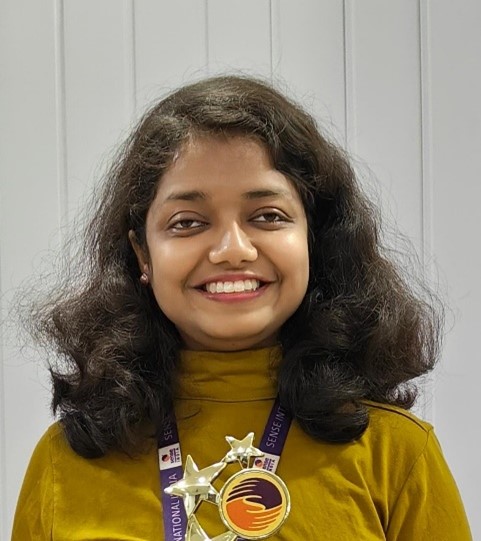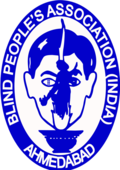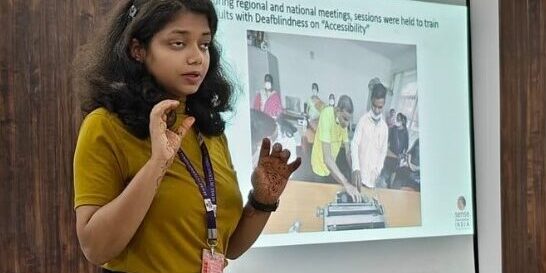Spunk is Shrutilata Singh’s second name
Shruti is the first deafblind person in India to graduate and work in the field of physiotherapy
Aruna Raghuram
Alone we can do so little; together we can do so much.” – Helen Keller
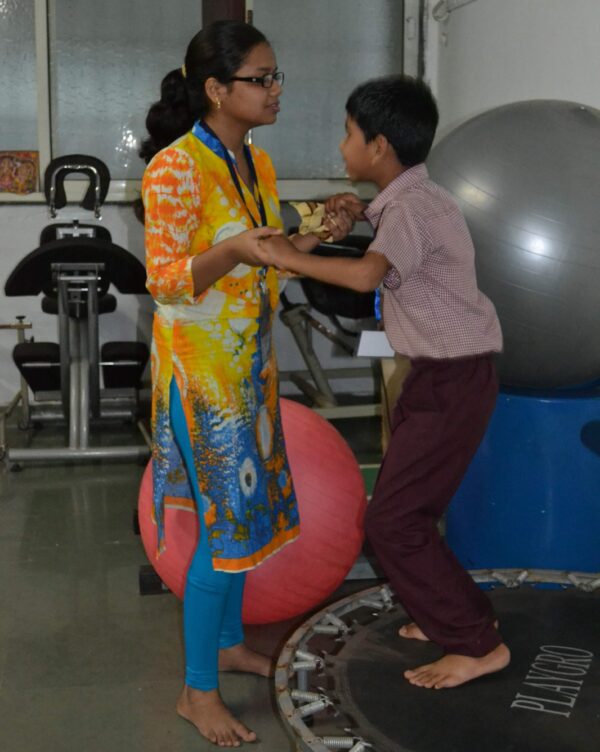
Consider this: 95 per cent of what we learn is through our eyes and ears. Can you imagine the challenges faced by those who are deafblind, that is, they have both sight and hearing loss?
Shrutilata Singh has been having progressive deafblindness since childhood. Yet the spunky 30-year-old has not let this deter her from finding meaning in life.
Shruti is the first deafblind person in the country to graduate and work as a physiotherapist. She has worked as a physiotherapist at early intervention centres helping children who have special needs.
Hellen Keller, who was deafblind, has described the childhood experience as “being at sea in a dense fog”. According to a 2019 research paper published in the journal ‘Indian Pediatrics’, it is estimated that there are more than 500,000 deafblind adults and children in India
Triumph of the spirit
Shruti was keen on becoming a physiotherapist and enrolled in a diploma course at the Blind People’s Association (BPA), Ahmedabad, the largest NGO in the country in the disability sector. Getting admission in a physiotherapy course was not easy for a deafblind person. Also, it was her willpower that enabled her to complete the rigorous four-year course in 2015. It helped that she had studied science in class 12.
While she was not able to hear the lectures, she would read transcripts on the screen of her mobile phone. She discussed her studies with other students using sign and tactile language. In a 2015 interview to the media, she has attributed her success to the unstinting support of her family, friends and teachers. “They never let my disabilities come in the way of success,” she has said.
Another challenge arose when she started working as a paediatric physiotherapist in an early intervention centre. “Some parents were shocked. A few even refused to allow me to touch their kids. But my skills convinced them that I was up to the mark,” Shruti said in the interview.
Today, nine years later, Shruti works for Sense International India in Ahmedabad as a senior specialist, network support. “Communication and information sharing is crucial. I am glad I am involved in providing exposure and opportunities for persons with deafblindness,” she says.
Shruti uses technology extensively to enable her to communicate with non-disabled people and to access material.
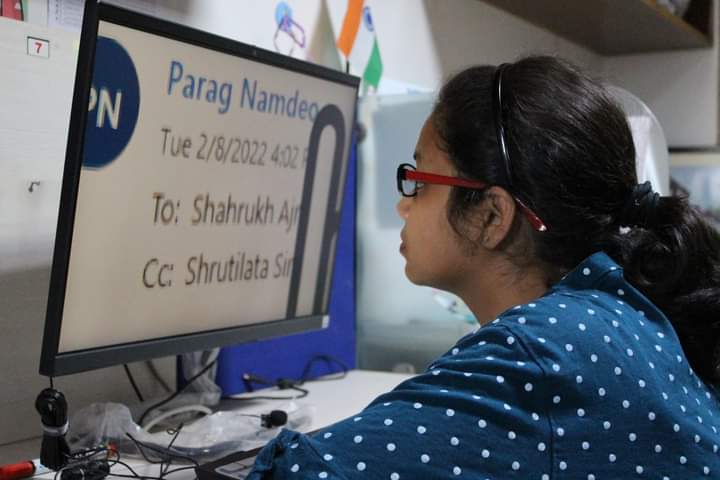
Childhood struggles
Shruti family is from Jharkhand but her parents settled in Gujarat when she was one year old. Much to the dismay of her family, her vision problems started when she was six and hearing issues showed up when she was nine years old. Since she was not born deaflind, she knows what it means to see and hear.
The doctor told her parents that the deafblindness was because of genetic mutation but the cause of the mutation was not clear.
Her parents live in Himmatnagar. Her mother is a doctor while her father was an engineer with the Railways, now retired. Her older sister is a software engineer while her older brother, who is also deafblind, works in a bank.
“I went to a mainstream English medium school in Himmatnagar till class 12. From class 4, I was unable to read the blackboard or hear what the teacher was saying. It was a huge challenge. I would go near the blackboard and copy what the teacher had written. Some teachers did not like this,” relates Shruti.
She credits her mother for motivating her. “My mother was very strict with me about education. She always urged me to achieve my best. I took up science in class 12. The practical’s part proved to be a problem,” says Shruti.
Apart from difficulties in communication, Shruti’s socialisation skills could not develop in school due to her disability. Children refused to sit next to her. She faced a great deal of isolation. “My cousin sister would explain what was happening in the school. I missed a lot of normal school life. I never had social outings with friends, for instance,” she adds.
Cheerful personality
Despite all this, her mother says Shruti has always been very cheerful. She was a bookworm in her growing years and would read using a magnifier. She enjoyed cycling before it became too dangerous for her. She could find her way to a place on her own, her mother has said in an earlier interview.
Shruti did a BA in English Majors from IGNOU. She then took up physiotherapy at BPA. Life looked up during her association with BPA. “When I came to Ahmedabad and joined BPA it was the first time I had lived away from family. Yet, I felt at home. I could communicate with people with different types of disabilities,” says Shruti.
BPA provided her with an interpreter from whom she has learnt tactile and sign language. She also started learning braille.
Classmates helped her by writing notes and so did teachers. She also learnt different ways of getting assistance in education. For instance, use of magnification facility in exams. Her social life also improved. She was made to feel included. She would join others for plays and movies.
During her time at BPA, she used to write poems about her relatives, surroundings and the world as she saw it. “I want to write a book, see the world and enjoy life. I have made a lot of friends in the hostel who understand my world. We chat a lot. I would feel great if I can make a difference to others’ lives,” Shruti has said in an earlier interview.
Advocacy work
Shruti’s work at Sense International India, which she joined in April 2020, involves advocating for the deafblind in various ways. She has presented papers at national and international conferences and made presentations on a variety of topics.
She has participated and contributed as a speaker at Global Disability Summit (GDS) and United Nations Girls Education Initiative (UNGEI). She is also an executive member of the Commonwealth Children and Youth with Disability Network (UNGEI representative).
“At present, my visual impairment is 95 per cent. I can see less than 5 per cent of what is around me. I can read, but very slowly. I can hear noises and music. But I cannot make out the words when people speak or the lyrics of songs. I need an interpreter to communicate. It was difficult to learn how to make presentations. It needed a lot of practice. I have developed a lot of confidence now and speak at conferences about my journey and other subjects,” says Shruti.
Her areas of interest are safety with accessibility, raising awareness about deafblindness, rights of girls and women with deafblindness, inclusive higher education for people with deafblindness, digital accessibility and technology support. She coordinates activities of the national network of adults with deafblindness (Udaan) supported by Sense International India.
At the International Purple Festival held in Goa in January 2024, Shruti was the ambassador for deafblindness. The festival is a time for celebration and empowerment for Persons with Disabilities (PwDs).
Tale of positivity
Shruti has been living in Ahmedabad for the past 10 years. “Being a girl and deafblind, there are safety issues. I live in an apartment with two friends. I have got used to managing on my own. Only when we get exposure do we learn to be independent,” she asserts.
“I am lazy about cooking but I help my flatmates with preparatory work. I make masala oats and khichdi well (with a laugh). I text my sister when I have doubts and am unable to understand something. I feel so comfortable in the office, I spend a great deal of time at work. I have good friends now, including virtual ones on social media,” says an upbeat Shruti.
“The more I interact with others facing challenges the more inspired I get. Everyone has a unique challenge and a unique way of handling it. I draw inspiration from everyone in my life. What gives me the greatest joy is to ‘sense’ the happiness of someone I have helped,” say the gritty youngster with a smile.
